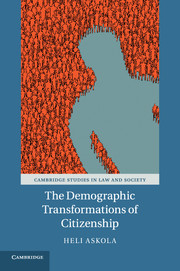Book contents
- Frontmatter
- Contents
- Acknowledgements
- 1 Introduction
- 2 Missing Citizens? Birth Rates and the Making of New Citizens
- 3 Misguided Citizens? Transitions into Adulthood and the Management of Diversity
- 4 Casual Citizens? The Desirable Labour Migrant and Conditional Citizenship
- 5 Depleting Citizens? Ageing Populations, Care and Migration
- 6 Conclusion
- Bibliography
- Index
- CAMBRIDGE STUDIES IN LAW AND SOCIETY
3 - Misguided Citizens? Transitions into Adulthood and the Management of Diversity
Published online by Cambridge University Press: 05 September 2016
- Frontmatter
- Contents
- Acknowledgements
- 1 Introduction
- 2 Missing Citizens? Birth Rates and the Making of New Citizens
- 3 Misguided Citizens? Transitions into Adulthood and the Management of Diversity
- 4 Casual Citizens? The Desirable Labour Migrant and Conditional Citizenship
- 5 Depleting Citizens? Ageing Populations, Care and Migration
- 6 Conclusion
- Bibliography
- Index
- CAMBRIDGE STUDIES IN LAW AND SOCIETY
Summary
As Cruikshank has noted, ‘citizens are not born; they are made’. Because of persistent birth-rate patterns as well as continuing and diversifying immigration, the next generations of citizens in the Global North are both smaller and more diverse. Concerns have therefore been expressed not just about the numbers of children being born, but about how well these ‘provisional citizens’ are transitioning into adulthood and whether they are growing up to embrace their roles as responsible and productive citizens. In modern states, youth has emerged as an important developmental period during which central demographic events that shape the future trajectories of citizens take place, but also one that is characterised by many possible risk factors, possibly compromising normative ideas about transitions into adulthood. In the context of economic globalisation and insecurity and more ethnic, cultural and religious diversity, longstanding yet mutating anxieties over teenagers and young adults as emerging citizens are meshing with fears over the integration of newcomers, the inevitability of cultural change and future risks to social cohesion. For the citizenship of young people of immigrant background, concerns are raised over both their age and also their immigrant origin, underscoring their status as ‘second-generation immigrants’ (citizens born to immigrant parents). Near-adults and young adults of immigrant background are thus located at the intersection of two sets of ambiguities about their readiness for adult citizenship – some related to their age, maturity and transition to adulthood and others associated with questions over their cultural belonging and loyalty, drawing attention to their transnational ties.
As a case study, this chapter starts with a jurisdiction that has seen one of the largest panics regarding the ‘integration’ of ‘second-generation’ young people and consequent efforts to reshape their paths as citizens (even as these young people's transitions into the labour market and adult citizenship are (again) shadowed by the risks of unemployment and precariousness). Reinforced by events such as the urban disturbances of 2001 (as well as the September 11 attacks) and the 2005 London bombings, demographic unease over young British Muslim citizens, especially of Pakistani and Bangladeshi origin, has been channelled into policies that fuse immigration control, criminal justice, integration measures and gender policies in an effort to steer young people of immigrant origin towards appropriate citizenship values and life trajectories.
- Type
- Chapter
- Information
- The Demographic Transformations of Citizenship , pp. 67 - 106Publisher: Cambridge University PressPrint publication year: 2016



